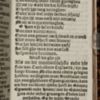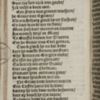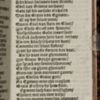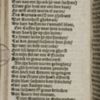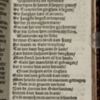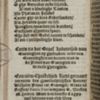Als nu dit moetwillichste ende die fleur van Ducdalbens Crijsvolck
Title
Subtitle
Digital Object
Image notice
Image / Audio Credit
Pamphlet: Göttingen NSUB: 8 H Holl II 2551 RARA, Nederlandse Liederenbank
Set to tune of...
Transcription
Alsmen schreef duysent vijfhondert
Jn dat achtensestichste Jaer,
Sachmen gheschien groot wonder
Te Brussel int openbaer,
Vier Grauen Edel van bloede
Dooden sy in corter stont,
Daer toe seer rijck van goede,
Jck wilse v doen condt.
Een Prins van grooter machten,
de Graue van Egmont,
Als een Schaep ginck hy ter slachten,
En daer was de ure en stont,
Men sach daer weenen en trueren
So menich Wijf en Man
Te Brussel binnen der Mueren
Om de Graue was Edel gedaen.
Cloeck ginck hy na der stede
daer hy moste steruen, verstaet:
Ghy Heeren en Burghers mede,
En isser nu gheen ghenaet,
Soo ben ick een arme Graue
daer toe gheen Edelman:
Niemant hem antwoort gaue,
de Graue sprack nu wel an.
De Graue nam sonder treuren
Een Cussen hoort dit bedien,
daerop hy den doot wilde besueren,
daer op booch hy zijn knien,
Te samen leyde hy zijn handen,
Ten Hemel siende seer soet,
Godt doende zijn Offerhande,
Die Graue dat Edel bloet.
Als zijn knien waren gheboghen,
En zijn handen waren gheuoecht,
Een heeft dat sweert wt ghetoghen,
Die den Graue zijn hooft af sloch:
Sijn bloet sachmen daer stralen,
Edel van Ordens verbont,
Godt sal die oorsake verhalen
Van die Graue van Egmondt
Al op der seluer uren,
Quam Edel van stam en Bloet,
Die Edele Graef van Hooren,
Liefhebbende Gods woort soet,
Lieflick sachmen hem daer treden,
Als een Slachtschaep ter doot
Comende ter seluer steden,
Daer hy moste steruen den doot.
Als hy daer was ghecomen,
Die Graue Delzijn genaemt,
Hy sprack vry sonder schromen,
En isser nu gheen ghenaed?
Niemant hem antwoort gauen,
Den Edelen Graue goet,
Na Egmont was zijn vraghen
Baals Pristers by hem stoet.
Egmont lach daer verslaghen,
Ghedect met een cleet dicht,
Aen zijn voeten wert hijt gheware,
Hy heeft het cleet opghelicht:
De Graue sprack met reden,
Sijt ghy daer Egmont,
Sijt ghy my voorghetreden,
Jck wil v volghen terstont.
Baals Priester met zijne cluchten
Tradt tot den Graue groot:
Gaet van my (sprack hy met suchten)
Want ghy doet my aen den doot:
Hy wist wiese waren al voren,
Des Duyuels en s Paus ghebroet,
Van Antechristus gheboren,
Die daer dorsten na t'onnosel bloet.
Een Cussen hy voor hem vanden
Daer booch hy op zijn knien
Te samen leyde hy zijn handen,
Tot den Hemel sachmen hem sien,
Hy voer wt dese Warande,
Heer ick beueel v mijn gheest
En mijn siel tot een Offrande
Sprack de graue onbeureest..
Als zijn knien waren geboghen,
En zijn handen waren geuoecht
Een heeft dat Sweert wtghetoghen
Die den Graue zijn hooft afsloech,
Sijn bloet sachmen daer blincken,
Edel van stamme root:
Dus sachmen de graue krincken
Van Hoorn seer minioot.
Twee Broeders in Gods vreden,
Van Batenburch twee Vorsten groot,
Beruoets sachmense treden,
Blootshoofts al na den doot,
Singhende wt helder kelen,
Wt David den sesten Psalm:
Straft my niet Heer in velen:
Tot Godt quam haerlieder galm.
Vrymoedich int openbare
Aenriepen sy haren Schepper groot,
De Trommelen ginghen allegare,
Die sloeghen daer al accoort:
De Jongste begost te trueren,
Hy liet so menighen traen,
Om dat het niet mochte ghebueren,
Dat die lieden hem conden verstaen.
Al comende op de stede,
de twee Grauen ionck van Jaer,
Sy waren in Godt te vreden,
Tot den doot begauen sy haer,
Haer knien sachmen haer booghen,
Men sloech hen daer af dat hooft:
O Godt hoe moechdijt al gedoogen,
dat v woort dus wert berooft?
Groot suchten ende claghen
Ende weenen gebrack daer niet:
Men hoorde mans en vrouwen gewagen,
O Godt wat grooter verdriet
Van de Heeren der Nederlanden,
diemen daer doot en brant,
En so menich man coemt te schanden
door Ducdalue den wreden Tyrant.
O Duckdalf met v genooten,
Sijt ghy niet sadt van tbloet
dat ghy in Napels hebt vergoten,
En voor mets soo menich man goet.
Waren dat niet Schelmsche wracken,
Dat ghy dien onghelesten Calck
Jnt broot oock dedet backen,
O ghy Verrader ende Schalck.
Al met v bloedighe Tanden
Als Pharao en Jesabel
Coemt ghy in dees Nederlanden,
Als Herodes quaet en fel:
Hanghen, moorden, en branden,
Ontlijuen al metter spoet:
Ghy sult met Babel comen te schanden,
Al om t'onschuldighe bloet.
When one wrote thousand five hundred
In the sixty-eight Year,
Saw one happen [a] great wonder
In Brussels in public,
Four Counts Noble of blood,
[Were] killed by them in short time,
Until then [they were] very rich in goods
I want to announce them to you.
A Prince of high power,
the Duke of Egmont,
Like a Sheep he went to the slaughter,
And there was the moment,
One saw there crying and mourn,
So many Women and Men
In Brussels within the Walls
Because the Duke was Noble.
Quickly he went to the city
where he had to die, hear [he said]:
You Lords and you Citizens also,
If there is no mercy now,
Then I am a poor Duke
And no Nobleman:
Nobody answered him,
the Duke spoke to them.
The Duke took fearlessly,
A Pillow which served him,
on which he the death wanted to endure
on it he bent his knees
together he joined his hands
He looked at Heaven very sweetly,
Did his Offering to God,
That Duke with Noble blood.
When his knees were bend,
And his hands were joined,
One had taken that sword
That cut of the Count his head:
One saw his blood flowing there,
Noble [and] bound with the Order,
God will recount the story
Of that Count of Egmondt.
Already at the same hour
Came Noble of stem and Blood,
That Noble Count of Hooren,
[Who] Loved Gods words sweet,
Lovely saw one him go there,
Like a Slaughtersheep to die
Coming to the same city
Where he had to die death.
When he came there
The Count named Delzijn.
He spoke freely without hesitation
And is there no mercy now?
Nobody answered him,
The Noble Count good,
After Egmont [it was like that] his questions,
[Were accompanied by] the Priests of Baal.
Egmont lay there defeated
Covered with a thick cloth
At his feet he [Hoorn] noticed it,
He [Hoorn] lifted the cloth
The Count spoke with reason
Are you there Egmont
Have you preceded me,
I will follow you now.
The Priest of Baal with his pranks
Came to the great Count:
Go away from me (he said with a sigh)
Because you lead me to death:
He knew who they were beforehand
The Devil's and Pope's spawn
Born of the Antichrist
Who thirst for innocent blood.
A Pillow he found for him
On it he bent his knees
He joined his hands,
Up unto Heaven one saw him look,
He enacted this indemnity,
Lord I command you my spirit
And my soul as a Sacrifice
Spoke the count fearlessly.
When his knees were bend,
And his hands were joined,
One had taken that sword
That cut of the Count his head:
His blood one saw there glitter,
Noble of descent [and] red
So saw one do evil to the count
Of Hoorn very honourable.
Two Brothers in Gods peace,
Van Batenburg two Princes great,
Barefoot one saw them tread
Bareheaded after death
Singing from clear throats,
From David the sixth Psalm:
Do not punish me Lord in [those] many ways:
To God they sounded their songs.
Freely in public
They called upon their great Creator,
The Drums all together went off,
They were beating there in harmony
The Youngest started to grieve,
He cried so many tears
So that it was not possible
That those fellows could understand him.
When they came to the city
the two Counts young of Years,
They were satisfied in God,
To death they went,
One saw them bending their knees
They cut of their heads there:
O God how could you permit this all,
that your word thus was robbed?
Many sighs and complaints,
And weeping did not lack there:
One heard men and women speak,
O God what a great sorrow
Of the Lords of the Netherlands,
Who they killed and burned there,
And so many men have fallen from grace,
By Ducdalve the cruel Tyrant.
O Duc d’Alva with your companions,
Are you not saturated with the blood
That you spilled in Napels
And previously knifed so many great men.
Was that not Roguish rottenness,
That you your unquenched chalck
Also baked in the bread,
O you Traitor and Rogue.
All you with your bloody Teeth
Like Pharaoh and Jezebel
You came in these Netherlands,
Like Herod evil and malicious:
Hanging, murdering, and burning,
Beheading everyone with speed:
You will like Babel fall from grace,
Because of that innocent blood.

